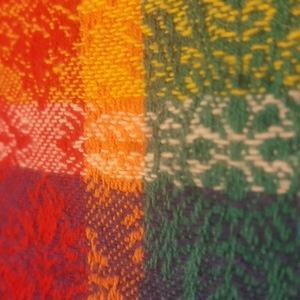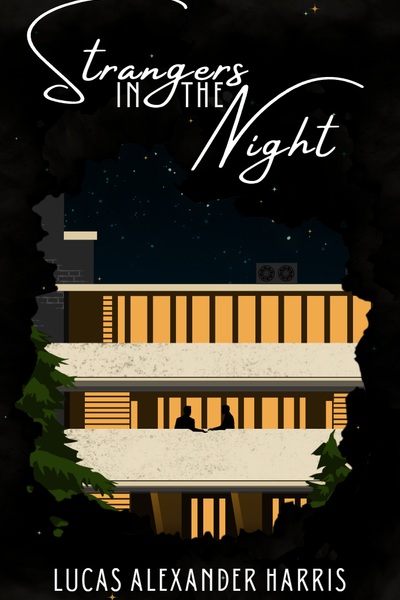“What’s the best thing you’ve ever designed?” asked a guest, smiling as their plate was removed. They sat forward, eyes fixed on Ian. “How cool was it?”
Ian smirked. “That’s such a hard question! I like everything I’ve done.”
“Oh, don’t be so modest, Mr. Randolph. Pick one you’ve really liked.”
He glanced into his drink, contemplating. “I think one that sticks out to me was one I did in...freshman year?” It stuck out for the wrong reason. “The brief was for a municipal building in a rural town. It was a sturdy thing. I didn’t want to go over the top and...make it look like it belonged somewhere else.” His design was of brick and wood, limited decoration externally, and the interior was flooded with light from countless skylights and windows. The rooms were arranged along two axes, with an expansive gymnasium that could be turned into a pool with a retractable floor. “I really liked it.”
His professors did not, chastising every aspect of the design while Ian stood there and took it, nodding. “I don’t know what you were thinking,” one said. “Did your mom help you make that?” another asked of his model, citing their love for Frank Gehry and Ricardo Bofill in the same breath. Another professor disregarded Ian’s presentation with three words – “It’s so derivative” – and then proceeded to ramble on for five minutes about a building (that stood for ten years) that they designed (now demolished) that won a single award (and was generally hated by the community).
His peers, at least, asked questions. Scathing, uncomfortable questions that made clear the consensus was, “Your building isn’t right.”
All of it was humiliating. The words stung, blistered Ian’s skin, sank deep into him and turned acidic.
Another classmate’s design, whose roof made Ian think of the sails of a 17th Century ship, made him cringe as he calculated how much it would’ve cost; even that was ripped apart by their professors. Maybe that’s why they wanted Ian to go last among his peers.
Their words sat with him like lead in his stomach. He didn’t eat. Ian didn’t sleep. He dwelled, hands shaking as he tried taking their words to heart and adding in their critiques, but he wouldn’t give up the basic principles of the design. The colors were saturated, and the interior turned fluid, filled with smooth, slippery surfaces where people could be sloshed around like water efficiently. All of it felt like a compromise, a money pit for this hypothetical rural town in his head.
He presented it to his professors in the following critique. He smiled through the immeasurable pain, disgusted nerves in his gut. He explained the thought process and outlined the added features, emphasizing the sturdiness and simplicity of the base design. There was no surprise; his professors ripped into him again. Their words felt more personal rather than actual critiques of his project. The only thing he remembered about it that could be classified as a helpful critique was his professors chastising him for using bricks in “an unoriginal way”. Ultimately, it was less a challenge of thought and more an attack on style. “We could commend you on trying something new if you did do something new,” said one of his professors.
“I don’t understand,” he said, his voice rising in desperation, indignation. A warble followed after his words, hurt and angry. Why his efforts were, in the end, wasted.
“Beauty is subjective, Ian, and your designs thus far are about as tasteful for the tasteless as it comes.”
“If you can’t get used to this, maybe you should go home, have your mom change your diaper, and really think about whether or not you want to be an architect.”
Ian didn’t remember the grade he got; he threw every scrap of that project away once the grade was finalized. He spent the next five years of college, and an additional three in a graduate program, giving up on his design principles – because “no one likes the old stuff” – and designing like everyone else, submitting to the cult-like beliefs of the professors that year and wishing, wishing, that someone would punch the fucking daylights out of them and let the students design the buildings they thought were right.
He graduated, wobbling back and forth about being an architect and making the world beautiful, and giving up and doing something else. Years of suffering under his own mediocrity amounted to swallowed pain and internal degradation.
Maybe that was his lot in life. To torture himself.
“Is it weird being here?” someone asked.
“No,” he said, too definitively for his own good. “I’m just here to support Melissa. If I wasn’t, I’d be out $500 for that chip and dip I bought her and Dan.” He laughed, hoping it’d lighten the mood.
“I feel like it’d be weird, having an ex come to my wedding,” another said. “It’s like...why open that wound again, right?”
“She broke up with him, remember?”
Ian glanced away, his smile faltering, tuning out of the conversation as he sipped his drink. The breath he took after was stilted, baked in red, and he hoped no one heard it. In his peripheral vision, he eyed the guest from the terrace, wondering if he needed to be bothered yet.
It seemed the taller man had the same idea. He glanced in Ian’s direction, made eye contact, and immediately turned away, flushed red.
None of the display wasn’t adorable, though Ian couldn’t understand why this man couldn’t just come over and ask to talk to him. He could still hear the guest’s sentiment on superficiality, a sensation ignored so quickly brought to the surface to the point of suffocation. Ian yearned for him to come back, to drown himself in the guest’s words, marked with a strange mix of hesitation and openness. He wanted more. So much more.
He wiped his mouth, turning back to the conversation. ‘He said he’d come over if he needed me,’ he reminded himself, biting his cheek. ‘I can’t start overwhelming that bridge already.’ Ian ran his thumbs over the sides of his fingers, soothing and grounding. “Again, I’m just here to support Melissa,” he managed to say. “I just want her to have a good weekend and enjoy herself. Is that too much to ask?”
Some of the table hummed their appreciation of the question. The lack of definitive response left Ian irritated, but still, he smiled.
“Mr. Randolph, are there any trends you’re following this year? I’m looking to redecorate my kitchen.”
Ian’s smile diminished, needing to stop himself from snapping back. “That’s...” Another stilted breath. His eyelid twitched. “I’m not an interior designer. You should probably ask someone else.”














Comments (3)
See all